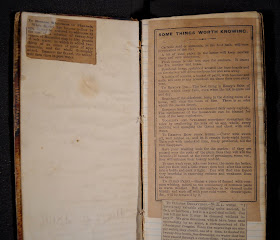 A member of the Hunt family recorded her distinct preference for desserts in a ledger book from the mid 1800s. Her recipe book has survived among the papers of five generations of the Hunt Family of Northampton, Massachusetts. Among dozens of newspaper clippings and handwritten notations are recipes for coconut macaroons, orange cake, cream pie, and ice cream. In addition to recipes, the book’s owner pasted in a number of practical household tips and popular remedies, including advice on silver polishing, pest prevention, freckle removal, and even goldfish husbandry. Dishes like Nottingham pudding, potted shad, and rice snow may be strange to today’s cooks, but familiar favorites like chicken salad, corned beef, and chocolate cake are also included.
A member of the Hunt family recorded her distinct preference for desserts in a ledger book from the mid 1800s. Her recipe book has survived among the papers of five generations of the Hunt Family of Northampton, Massachusetts. Among dozens of newspaper clippings and handwritten notations are recipes for coconut macaroons, orange cake, cream pie, and ice cream. In addition to recipes, the book’s owner pasted in a number of practical household tips and popular remedies, including advice on silver polishing, pest prevention, freckle removal, and even goldfish husbandry. Dishes like Nottingham pudding, potted shad, and rice snow may be strange to today’s cooks, but familiar favorites like chicken salad, corned beef, and chocolate cake are also included.One member of the cook’s family would not have approved of the corned beef. In addition to being a noted abolitionist and station master on the Underground Railroad, Seth Hunt (1814-1893) was a vocal vegetarian. He wrote a number of newspaper opinion articles on the benefits of a meat-free diet, proclaiming in one case: "Nature, in unmistakable language written on the anatomical structure of man, declares that his natural diet is derived from the vegetable kingdom, embracing the wonderful varieties of delicious fruits, glowing with rainbow hues and heavy with ambrosial juices; thus at once delighting the eye and regaling the taste." Hunt published vociferously on a variety of topics, and Rauner has clippings from many of his articles. It's documents like the recipe book, though, which give us a fuller picture of the quotidian life of a 19th-century New England family.
Both the recipe book and Seth Hunt’s newspaper clippings are part of the Hunt Family Collection at Rauner, which encompasses materials spanning nearly two hundred years of New England history. Ask for MS-1173.

No comments:
Post a Comment